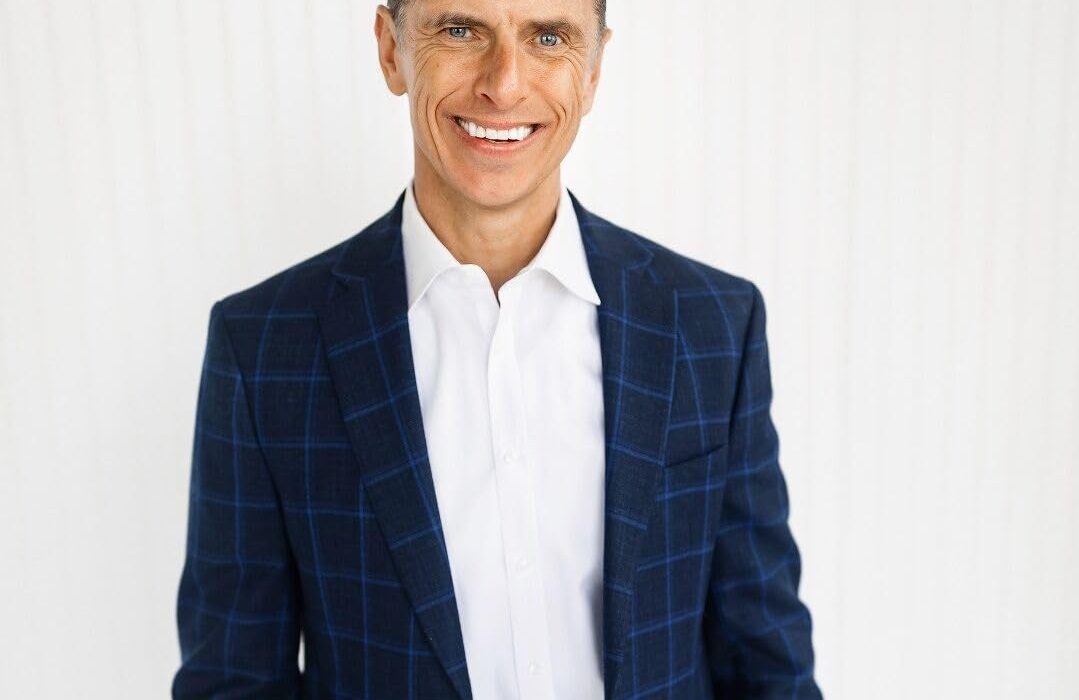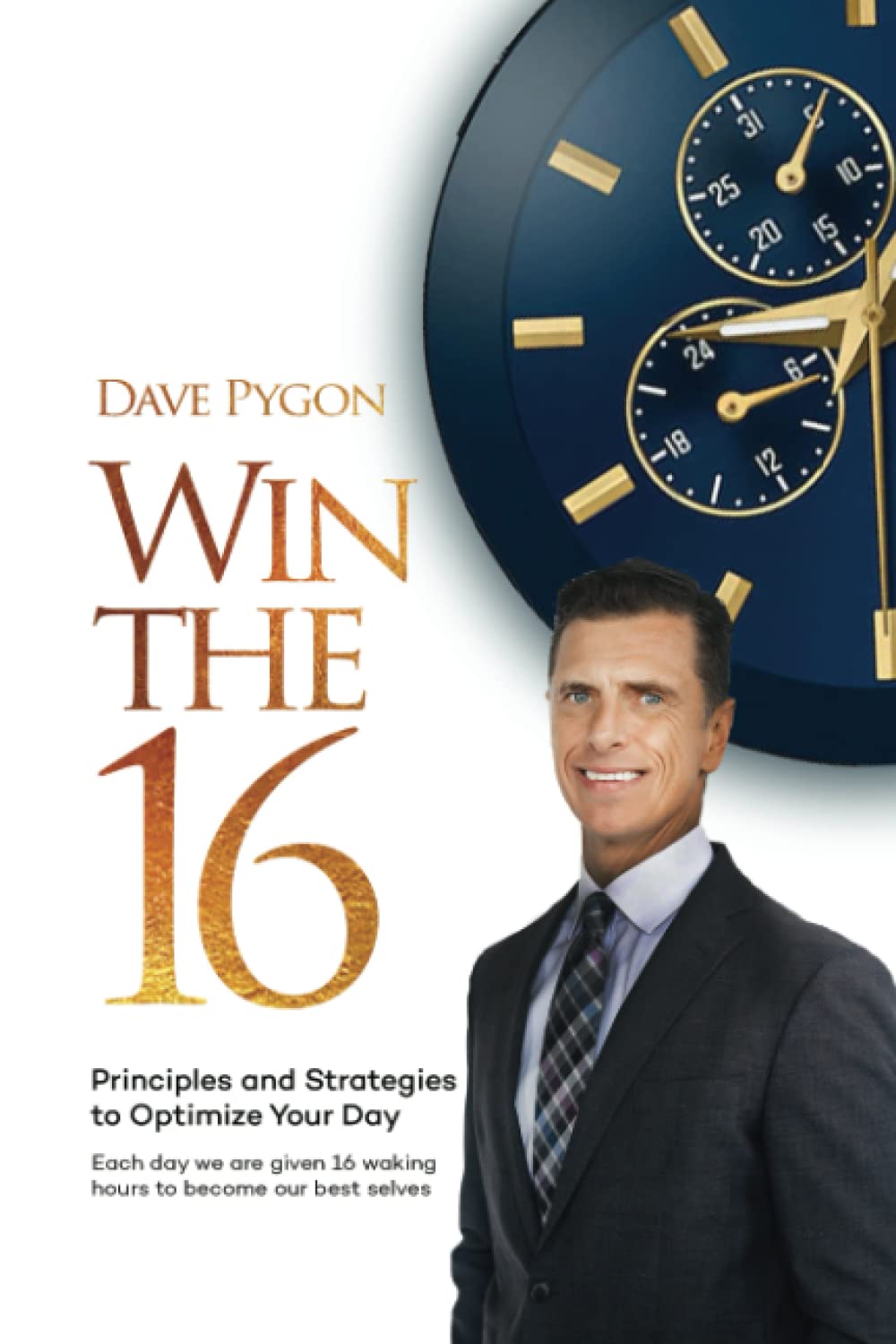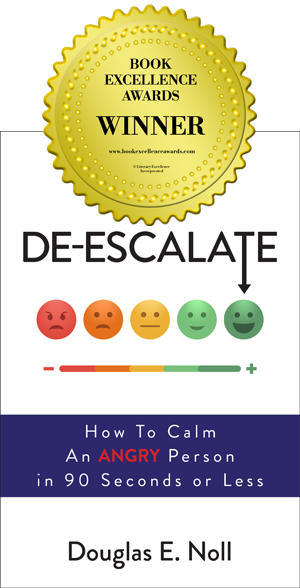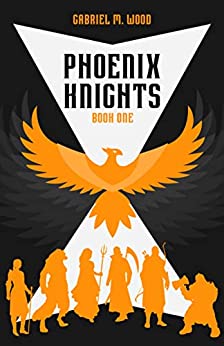Can you provide an overview of the key principles and strategies outlined in “WIN THE 16” by Dave Pygon?
These principles will assist us in optimizing our day
- Early successes in your Day
- Mindset
- Habits and Discipline
- Time Management
- Accountability and Healthy Lifestyle
- Change Agility
- Self-coaching and Coaches
- Happiness and Future
- Mission Plan
To “Win the 16”, we have to be accountable for our actions and nonactions, taking ownership of our day, and setting authentic goals. Mental toughness is a pivotal skill because the world we live in is complex, and tough. It’s difficult to accomplish all that needs to be done in a day. People need to be able to “dig” deep at times and go beyond what they believe they can accomplish. Inspiration, and motivation are principles of “Win the 16” to support all on their journey to become their best selves. When we aren’t inspired or motivated is when habits, and discipline need to be in place. The world is evolving fast, so change agility is imperative to our success in optimizing our day. None of us should desire to be the expert of yesterday. We want to be the expert of tomorrow.
How does “WIN THE 16” propose optimizing your day? What specific techniques or approaches does it recommend?
Win the 16 is defined as the following:
Each day, we are given sixteen waking hours to conquer. Win the 16 means taking full advantage of those hours. It means embracing discipline and making choices to achieve victories, no matter how small, throughout the day. Winning is a habit, and successes early in the day can cascade further successes. Challenges and unforeseen moments are sure to happen, but winning the sixteen means course correcting and adjusting our mindset to optimize the moment, be our best selves and finish the day proud.
Win the 16 proposes uncovering an area or two to focus on, develop a plan, find accountability partner, create checks/balances, and work on it routinely. You need to own it. You have agency. The coach, or accountability partner are pivotal to keep you on track. It will take honest, and open communication with the two of you.
The key technique, and approach is to stay disciplined focusing on a skill set or two daily remembering small incremental results will lead to bigger results down the line. Imperative, we take it one-day at a time.
What motivated Dave Pygon to write “WIN THE 16”? Are there any personal experiences or insights that influenced the book’s content?
My mother raised three boys on her own with help from her parents. She demonstrated many of these principles to us, while growing up. I have been living this lifestyle my entire life. I just didn’t realize it until my oldest brother made that comment that I was. Now, I wasn’t very good at this in my younger years and even today I have set backs just like everyone else. The difference now, I believe and understand these principles so well that when I begin to have a miss I identify it early, so I can rectify it. This helps me get back on track. Mark Twain said it well, “write what you know”. This is exactly what I did. Also, Mark Twain said, “you will become what you write”. Since writing this book, I am getting better than I was before at winning my day.
Can you discuss any scientific research or studies that support the effectiveness of the principles and strategies presented in the book?
The data to support the principles and strategies in this book have been tested in time. The concepts in “Win the 16” aren’t new. They have been proven to work. I am sharing them in a different manner, from a different perspective with stories from someone that could be your neighbor. He isn’t a Navy Seal, actor, or professional athlete. It comes from someone that is a south side Chicagoan who is just like you. He proves, we all have agency. We all can use these principles to become our best self. It’s not easy, but it can be done. The energy and positivity in the book starts from the beginning of the book, and it doesn’t stop until the last page. “Win the 16” is a recipe that anyone can use to focus on themselves to become better and more productive each hour of the day.
How does “WIN THE 16” address the issue of time management? Does it provide practical tips or frameworks for prioritization and productivity?
The book addresses time management in three practical ways that are beneficial to the reader.
- It shares potential time thieves in people’s lives that could be interrupting their ability to optimize their day.
- Lists ideas and ways to be more productive. One example would be don’t check email until you do something productive or a priority.
- Asks the reader to chart its entire day from the beginning until they go to sleep.
Are there any unique or unconventional approaches to optimizing one’s day in “WIN THE 16”? What sets it apart from other books on productivity?
I don’t believe it’s one thing that separates “Win the 16” from other books. It’s all of it together that separates this book from others. The principles in this book build off each other. It’s systematic. Optimizing your day starts with a plan, and habits then leads right into early successes. This might be unique to some, but “Win your day by 10am”. Complete goals and priorities early in the day prior to all the interruptions that could occur.
One potential item in this book that could be different is the chapter on Healthy Lifestyle. “Win the 16” believes you can’t become your best self without focusing on your mind, body, sleep, nutrition, and exercise. You can create wonderful habits for your personal life and professional life, but if you don’t focus on your sleep, and how you take care of yourself you can’t become your best self. You need the energy all waking hours and sleep, nutrition, mind, and body all play a role. This book is about being productive, and efficient for your personal, and professional lives, but also taking care of your mind and body.
Can you share some examples of real-life success stories or case studies that illustrate the impact of implementing the principles and strategies from “WIN THE 16”?
In the book, I communicate a story when I was 50 years-old I decided to learn how to swim. The journey began November 20th when I started reading a book on how to swim. The training began December 1st. I implemented many of the principles in “Win the 16” to learn how to swim. I would rise at 5am with a growth and positive mindset. Immediately, it was imperative to demonstrate discipline, habits, small successes, handling unforeseen obstacles such as it was cold/dark outside and I wasn’t very good at swimming. It forced me to fight through it, which took mental toughness, and discipline. Another important principle. The end-result was seven months later, I completed my first triathlon.
A second example, I left a really good job, and a company that I have worked with for 24 years to start my own company, create a podcast, and write a book. Many could view this as a big “risk” potentially affecting my ability to retire in my early sixties. This took change agility, discipline, accountability, mental toughness, mindset, handling unforeseen obstacles, inspiration, goals, and time management, which are all principles of “Win the 16”. The company a year later is on solid ground, book sales are good, and our podcast has been listened to in five different continents. Thank you “Win the 16”.
What are the potential challenges or obstacles individuals might face when trying to incorporate the principles and strategies outlined in “WIN THE 16”? How does the book address these challenges?
The challenge with implementing any of these principles or consistently implementing them is the ability to change, make sacrifices, create new habits, adopt a growth mindset, unlearn to relearn, be uncomfortable, take a risk, and genuinely commit to the strategy with full commitment.
The book shares ideas how to do these things. It communicates strategies, and takeaways at the end of every chapter about the principle in that chapter. For example – in handling stressful situations or moments, the book articulates step 1. Take deep breaths. This will assist you with some clarity, and slows things down.
Does “WIN THE 16” focus solely on personal productivity, or does it also explore strategies for improving professional productivity or achieving work-life balance?
“Win the 16” is 100% about personal, and professional productivity. It also discusses work-life balance. The principles outlined, and discussed will support productivity on all levels of your life. In fact, Chapter 16 is about healthy lifestyle, which affects personal, professional, and work-life balance.
In “WIN THE 16,” does Dave Pygon address the role of technology and digital distractions in our daily lives? How does he suggest managing these challenges?
Yes. The book suggests don’t check your electronics until you have accomplished a priority or goal first thing in the morning. “Win the 16” shares how social media can sabotage your day by dwindling at some of your time. The book discusses how you should schedule potentially when you should check email, so you aren’t doing it too often. Spend time being on the offense, which is your agenda/priorities, and goals not always on defense, which is other people’s agenda’s.
Can you discuss the long-term benefits that readers can expect to gain by implementing the principles and strategies from “WIN THE 16”?
If people implement and/or improve on some of these principles they can increase productivity personally, professionally, and increase their own happiness. The strategies in this book lived out routinely will propel people’s development to new heights. One item to note, when you understand these principles so well, and you have that day that you aren’t productive the great news is you will identify it quickly, so the next day you can get back on track. Many people get so busy doing things they don’t even realize they are busy but not productive. “Win the 16” is about being productive, and efficient. At first, the reader will derive some small wins, but continuing to follow these principles they will down the line turn into bigger wins. It is recommended to celebrate small, and large wins to keep motivation alive.
Has Dave Pygon written any other books or resources related to personal or professional development? How does “WIN THE 16” compare to his previous work?
- First-time author.
Are there any specific tools, apps, or resources recommended in “WIN THE 16” to support readers in implementing the principles and strategies effectively?
The book is the resource to use. There is a section to develop a mission plan. Also, there is a section to develop your greatest 365, which is a stretch exercise to complete an assignment demonstrating what a great year for you, the reader would look like.
How does “WIN THE 16” approach the concept of goal setting and goal achievement? Does it provide a framework for setting and tracking progress towards goals?
The book discusses how goals have to be authentic to the person. They have to be achievable, but not easy. The goals will NOT be reached unless discipline, and habits go along with it. Why? Motivation is wonderful, but it’s not a constant. We aren’t always motivated, so this is where discipline, and habits will ensure people reach their goals.
“Win the 16” shares a couple of stories where goals were accomplished and to say, they were stretch goals would be an understatement. Most great things happen with a goal in mind.
What feedback or reviews has “WIN THE 16” received from readers or experts in the field of personal development and productivity?
Amazon reviews thus far are all 5-Star. Just under 20 reviews. None were paid for.
All the people below have read the book, and put their name behind it. None were paid to do it. The names below are Harvard M.D., Professional Football Player, Multiple CEO’s, Two authors, Business Owner’s, and General manager.
“Sometimes keeping it simple produces the most profound results. I’ve read numerous self-help and leadership books and they don’t always ring true. Win the 16 by Dave Pygon hits the mark for me. Coming from a similar hard working immigrant background puts it into perspective. I use this book in my daily life and work. I think you will also when you read it.
- Allen D. Hamdan, M.D., Associate Professor of Surgery, Harvard Medical School, and Vice Chair Department of Surgery Beth Israel Lahey Health
“Finding focus with all the distractions of the modern world is no easy task. What Dave has done with Win the 16 is to provide proven tips and best practices so today’s leaders can lock into their goals. Each meaningful story helps the reader visualize how to achieve a winning style for the life they want. I can see this book being used as a manual for those looking to clean up their habits and gain self-discipline in the workplace and in all relationships.
- Gail Taggart, CEO, L3 Hospitality Group, Inc
“Win the 16 is for every leader, parent, friend or individual who is searching for life’s secret guide to truly being happy, secure and successful. This book is a wonderfully powerful yet simple blueprint for how we can all achieve happiness and success by living each day with a clear shift in mindset, behavior, discipline, and accountability.”
- Patrick Mooney, CEO, SpyGlass Pharma
“The principles in Win the 16 are applicable to professional athletes and others that want to develop themselves. Dave was the president and coach for my high school AAU basketball team. The strategies he shares in the book are the same he communicated to us ten years ago. They continue to be a part of my life.
- Miles Boykin, NFL Professional Football Player, Pittsburgh Steelers
As a fellow author & small business owner, I easily relate to Dave’s journey. In his Win the 16, he successfully describes his winning strategy in an impactful book. Dave is winning the 16 and shows how you can too.
- Jeff Hoffmann, award winning debut author of “Other People’s Children” and Co-Founder of Advanced Information Solutions
“Wonderfully uplifting and practical wisdom from a first-time author. Weaving in entertaining anecdotes and stories. Dave Pygon brings the wealth of his lengthy business career to life with a very personal touch! As a very busy spine surgeon and businessman, I can honestly say his “Win the 16”, as outlined in this book and illustrated in his podcast, has been enlightening, easy to implement, and most importantly, very effective for me personally and professionally!
- Dante Implicito, M.D., Section Chief, Spinal Surgery Hackensack University Medical Center, President and CEO, DocSecure Insurance Company
“If you’re wondering what differentiates highly successful people and would like to improve your daily impact, this book is a must read. Win the 16 is practical, insightful, action-oriented, and full of distilled wisdom for people at all stages of their career and personal journey.”
- Anthony Wallace, Vice President & General Manager, Bausch + Lomb
“Having read many leadership books through the years, I found Win the 16 refreshing and different from many traditional leadership novels. Dave Pygon’s effective use of storytelling shares how different leaders inspire others to greatness and helps educate the reader on critical concepts such as inspirational leadership, motivational leadership and goal setting. Win the 16 is a mindset, philosophy and lifestyle that is well worth the read!”
- David Mayer, M.D., author “How to Stay Safe When Entering the Healthcare System”, Founding Director Emeritus, MedStar Health Institute for Quality and Safety
Purchase Link
https://amzn.to/44pTHLk
Website

John’s the resident literary connoisseur. He dissects classics and uncovers hidden gems. Expect his insights to enrich your reading journey, one page at a time.






